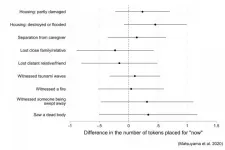Living for today: Exposure to disaster may cause impatience in children
2021-03-18
(Press-News.org) Study finds that children who experienced housing loss in the 2011 Great East Japan Earthquake are more inclined to opt for short-term gratification
Tokyo - Living through a tragic event might make us more inclined to live for the moment, but not always in a good way. Research is looking into the psychological after-effects among children who survived the 2011 Great East Japan Earthquake, and a recent study may have made a connection: the children may forgo greater long-term reward for short-term pleasure.
Among the traumatic experiences in the quake and subsequent tsunami that killed almost 16,000 people, some survivors witnessed people washed away and had their houses destroyed. A study from Tokyo Medical and Dental University (TMDU) analyzed data collected in 2012-2014 on 3- to 5-year-old survivors of the disaster.
The researchers found that some of the children tended toward what's called "delay discounting behavior", or favoring smaller short-term rewards over larger rewards given later. The findings were published in PLOS ONE.
"The shock of being in a disaster can change our trust in the world, and this may lead to impatient behavior," study co-author Takeo Fujiwara says. "But we don't know a great deal about children who go through this process."
The children in the study were interviewed to uncover what trauma(s) they had experienced. They later took part in a time-investment exercise to gauge their ability to delay gratification. They were offered five tokens: one token equaled one candy now or two a month later. They were asked to assign each of the five to "now" or "one month later."
Among the various forms of trauma, which included losing a caregiver, witnessing the tsunami waves or fires, or seeing a dead body, the children whose had lost their housing had higher delay discounting. In other words, they assigned more tokens to "now," showing preference for smaller reward in the short term.
Interestingly, the researchers found no association between delay discounting and other traumas. So, why this association with housing loss?
"Children who lose their housing may have their lives disrupted for a long time, as they live in temporary or other housing" first author Yusuke Matsuyama says. "That may differ from witnessing a life-threatening event, which is traumatic but children may recover after they go through a grieving period."
After having experienced a disaster, there may be prolonged periods of recovery and instability. Being without housing in this period may induce stress or sadness, which may lead to impatience. The TMDU study offers specific insight into the emotions of children who survive this trauma.
INFORMATION:
The article, "Delay discounting in children exposed to disaster," was published in PLOS ONE at https://doi.org/10.1371/journal.pone.0243994
[Attachments] See images for this press release:

ELSE PRESS RELEASES FROM THIS DATE:
2021-03-18
In their pursuit of maximum reward, people suffering from gambling disorder rely less on exploring new but potentially better strategies, and more on proven courses of action that have already led to success in the past. The neurotransmitter dopamine in the brain may play an important role in this, a study in biological psychology conducted at the University of Cologne's Faculty of Human Sciences by Professor Dr Jan Peters und Dr Antonius Wiehler suspects. The article 'Attenuated directed exploration during reinforcement learning in gambling disorder' has appeared in the latest edition of the Journal of Neuroscience, published ...
2021-03-18
In cancer immunotherapy, cells in the patient's own immune system are activated to attack cancer cells. CAR T cell therapy has been one of the most significant recent advances in immunotherapies targeted at cancer.
In CAR T cell therapy, T cells are extracted from the patient for genetic modification: a chimeric antigen receptor (CAR) is transported into the cells using a viral vector, helping the T cells better identify and kill cancer cells. When the antigen receptor cells identify the desired surface structure in the patient's cells, they start multiplying and killing the target cells.
CAR T cell therapy was introduced to Finland in 2018, and the treatment form has been used in support of patients suffering from leukaemia and lymphomas.
So ...
2021-03-18
A Delphi survey carried out by Dr Lyn Robinson, Head of Department and Reader in Library and Information Science at City, University of London, and Dr David Haynes, former Visiting Lecturer and Post-Doctoral Fellow in City's Department of Library and Information Science, has revealed priorities for protecting personal privacy online.
Their research study, "Delphi study of risk to individuals who disclose personal information online", published in the Journal of Information Science, was conducted at City in 2019, and is based on the views of a panel of privacy and information security experts.
A literature review, published between 2014 and ...
2021-03-18
For years, in the vastness of our galaxy, astrophysicists have been tracking down pevatrons - natural accelerators of particles with monstrous energies. Thanks to the HAWC Observatory for Cosmic Radiation, another probable trace of their existence has just been found: photons with some of the highest energies. However, what is particularly important is that this time the high-energy photons have not only been recorded, but also their probable place of origin has been determined.
We know they exist, we just don't know where exactly they are or what they look like. Pevatrons - because this is what we are talking ...
2021-03-18
Marine heatwaves are dramatically affecting the marine ecosystems of the world and the Mediterranean is no exception. In the Mediterranean, these extreme climate episodes and its resulting massive mortality of species are getting more and more intense and frequent. To date, most of the studies analysed the effects of these perturbations on specific species and populations, although researchers still do not know how this affects the functioning of the involved ecosystems.
A new study led by the University of Barcelona (UB) and the Institute of Marine Sciences (ICM-CSIC) has stated that marine heatwaves are having a strong impact on the functioning of coraligen, one of the most emblematic ...
2021-03-18
A new study comparing decades of environmental monitoring records has confirmed that Canada's caribou are not faring as well as other animals like moose and wolves in the same areas--and also teased out why.
The study used 16 years of data to examine changes in vegetation, moose, wolves and caribou.
"Caribou are declining across Canada and have been recently lost in the Lower 48 States," says Melanie Dickie, a doctoral student with UBC Okanagan's Irving K. Barber Faculty of Science.
"Understanding why caribou are declining is the first step to effectively managing the species--it tells ...
2021-03-18
Native reptile populations on Christmas Island have been in severe decline with two species, Lister's gecko and the blue-tailed skink, entirely disappearing from the wild. While previously the main driver for this decline is likely predation by invasive species and habitat destruction, a silent killer is now threatening to wipe the species out entirely.
Those bred in captivity on the Australian Territory in the Indian Ocean have also been mysteriously dying, leaving the two species - which number only around 1000 each - in danger of extinction. Veterinary scientists from the University of Sydney, the Australian Registry of Wildlife ...
2021-03-18
A radio telescope located in outback Western Australia has observed a cosmic phenomenon with a striking resemblance to a jellyfish.
Published today in The Astrophysical Journal, an Australian-Italian team used the Murchison Widefield Array (MWA) telescope to observe a cluster of galaxies known as Abell 2877.
Lead author and PhD candidate Torrance Hodgson, from the Curtin University node of the International Centre for Radio Astronomy Research (ICRAR) in Perth, said the team observed the cluster for 12 hours at five radio frequencies between 87.5 and 215.5 megahertz.
"We looked at the data, and as we turned down the frequency, we saw a ghostly jellyfish-like ...
2021-03-18
The research team led by Prof. YANG Lihua from Hefei National Laboratory for Physical Sciences at the Microscale, School of Chemistry and Materials Science of the University of Science and Technology of China (USTC) of the Chinese Academy of Sciences proposed nanomicelles composed solely of macromolecules as a new approach for treating pancreatic tumor. The study was published in ACS Applied Materials & Interfaces.
Host dense peptides (HDP) is a part of the innate immunity of eukaryotic organism. It helps the host fence back attack by microbes through disrupting cellular membrane integrity. Inspired by HDP, membrane-disruptive macromolecules are designed with two most HDP's common structural characteristics (cationic and amphipathic) to realize similar membrane-disrupting ...
2021-03-18
WASHINGTON--People who start eating before 8:30 a.m. had lower blood sugar levels and less insulin resistance, which could reduce the risk of developing type 2 diabetes, according to a study presented virtually at ENDO 2021, the Endocrine Society's annual meeting.
"We found people who started eating earlier in the day had lower blood sugar levels and less insulin resistance, regardless of whether they restricted their food intake to less than 10 hours a day or their food intake was spread over more than 13 hours daily," said lead researcher Marriam Ali, M.D., of Northwestern University in Chicago, Ill.
Insulin resistance occurs when the body doesn't respond as well to the insulin that the pancreas is producing and glucose is less able to enter the cells. People with insulin resistance ...
LAST 30 PRESS RELEASES:
[Press-News.org] Living for today: Exposure to disaster may cause impatience in children




